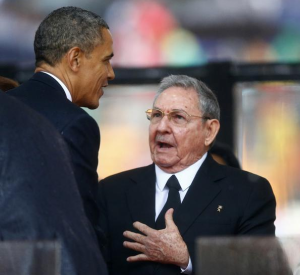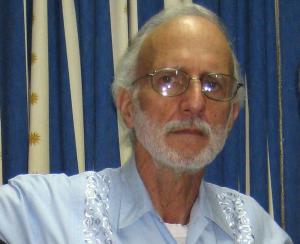Benjamin Simon
Staff Writer

The conflict between the United States and Cuba goes back to 1959. The problems began when the Cuban Revolution occurred, which brought Former President Fidel Castro to power. Shortly after this, America decided to cut ties with Cuba. Until now.
In 2009, Mr. Alan Gross was arrested in Cuba. The American born employee of the U.S Agency for Development was in Cuba trying to improve the communication network for Jewish Neighborhoods. As he continued to provide sources of technology intelligence for these citizens, he was detained. After Mr. Gross was accused of “Acts against the Independence and Territorial Integrity of the State” in 2011, he was sentenced to a grueling fifteen years. With his mental and physical health slowly deteriorating by 2014, his family wondered how much longer he could live.
For the past years, President Barack Obama has made it a priority to bring home Mr. Gross. However, he knew it would not be an easy task to negotiate the return of a prisoner with a country that America has not been able to cooperate with for tens of years. President Obama started by releasing two members of the Cuban Five, a group of men who were thought of conspiracy and espionage, in 2013.
Still, Cuba refused to allow Mr. Gross to return home. Amidst almost ten meetings in Vatican City and over the phone, the foggy details began to clear between President Obama and President Raúl Castro.

Image courtesy of: 140412-alan-gross-mn-1200_9d76532e0413553f774fae120c0cdbb9
Many months later, the other three members of the Cuban Five were released and Mr. Gross was set to return home. On December 17, 2014, Mr. Gross stepped on American soil for the first time in almost half of a decade.
This swap was a great step in President Obama’s intentions to resume diplomatic relations with Cuba. Since their refusal to talk decades ago, Cuba’s economy has had some troubles. The losing one of its largest suppliers and buyers has provided its toll. This exchange of prisoners has raised many eyebrows. Should America make strides to better their relationship with Cuba? Can America really call them allies? Isn’t it a huge problem if America has such a bad relationship with Cuba that people cannot fly from here to Cuba?
“I think normalizing relations with Cuba, and other ‘enemies’ like Iran are necessary for diplomacy to be possible,” said Mr. Herman, the digital video and photography teacher at Science Leadership Academy, who visited Cuba in 2008.
His visit showed him that many of the pre conceived ideas about Cuba as a pessimistic and terrible country are not always true.
“And yet, with all of the daily struggle Cuba is a very happy, excited, energetic and optimistic place,” explained Mr. Herman. “Simply stating ‘Soy de los estados unidos’ was normally met with a huge smile and a big conversation as if we had been friends for years.”
His experiences there have convinced him that open diplomatic relations are best.
“Without such measures it feels impossible for our societies to work together to avoid deeper, more damaging conflicts,” he said, “Opening channels of communication is critical to moving forward. Simply put, It’s about time!”
Arsenio Gomez, a sophomore at SLA, added a different perspective.
“America is going to be in a worse situation,” he said. “We need to worry about ourselves before we try and save the world. [America is] trying to expand too fast and be friends with everyone.” He also noted that America has its own gaping problems that need to be fixed before we worry about the relationship with Cuba.
“Obama’s executive decision to re-establish an embassy and an official ambassador in Cuba is an important step in the right direction,” added Mr. Herman in the interview with SLAMedia, “If anything, this will hopefully lead to an easing of restrictions on Cubans traveling back and forth so they can be reunited with family members they haven’t been able to see in years.”
Like it or not, America and Cuba are taking giant strides in resuming of diplomatic relations.
Leave a Reply